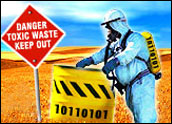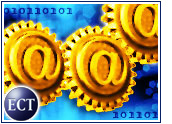
Ahhh-choo! Ahh, lucky you. Every time you are exposed to a virus, your immune system builds resistance to that particular bug. So, why can’t we build computers that do the same thing?
“If our bodies functioned like computers, we’d be extinct,” said Steve Hofmeyr, founder and chief scientist of Sana Security. “The body is a dynamic place that profits from changes,” he told TechNewsWorld. “Our immune systems adapt with us from birth to puberty and through the aging process.”
Perhaps the promise of biological computing is that our machines will grow up, rather than grow obsolete. But while it’s easy to draw analogies between how the human immune system works and how virus protection software programs should work, mimicking nature is no simple task.
Designing Survivability
According to David Evans, professor of computer science at the University of Virginia, we may not be able to develop computer programs that mimic biology exactly, but we can learn techniques from biology that enable us to build more scalable and robust systems. Several of Evans’ projects are supported by National Science Foundation (NSF) grants.
“Our goal is to produce complex, predictable behavior from a large number of unreliable components,” he said. Someday, Evans added, our computers could manage to remain up and running even as new viruses spread, “…the same way an organism survives even when its cells fail and its environment changes.”
He noted that we can learn from studying other natural defense mechanisms, such as decentralization and diversity. “Immune systems are part of the solution, but not all of it — neither in computer systems nor in nature,” Evans explained. “The success of the immune system relies on organisms continuing to function even after a few cells are infected, so the body has time to produce enough antibodies to react,” he told TechNewsWorld.
“I think the future of computing will depend on both directions of research — changing the way systems are built to make them intrinsically less vulnerable, and developing immune systems for mitigating attacks,” Evans said.
Bad Bugs Teach Good Habits
Unfortunately, the environment in which our computers live — that is, the world of the Internet — is increasingly hostile. Every new virus and worm seems to spread more quickly than the last. And we have ourselves to blame.
“The Internet is a totally connected infrastructure,” said Steve Trilling, senior director of research at Symantec. “That means we’re only as strong as the weakest link.” If every computer user simply protected his or her own laptop or PC, Trilling said, virus and worm writers would have to pursue another form of entertainment.
On the bright side, a computer user who suffers the effects of a virus typically responds like the heart-attack survivor who, overnight, adopts healthy habits. Each time a new virus is reported, we download patches and upgrade security systems in droves. After the SoBig attack last fall, hundreds of thousands of computer users updated software, installed virus protection and reconfigured firewalls.
Microsoft’s TechNet saw a more than 1,000 percent increase in unique visitors the week SoBig hit; Symantec’s online unique visitor count increased more than 300 percent.
The good news about malware, then, is that each new worm, virus or blended threat encourages more users to develop “healthy” habits. Theoretically, at least, that should make for a stronger Internet environment.
Trilling noted that there is widespread interest in developing antivirus and data recovery systems that mimic our bodies’ natural defenses. But while Symantec’s current products incorporate some artificial intelligence, such as learning to recognize real threats versus legitimate user behavior, Trilling said systems that are truly self-recovering are still in early research phases.
Building Immunity
Like Evans, Sana Security’s Hofmeyr has spent years contemplating bugs of both the electronic and biological sort. After completing his undergraduate degree in computer science and writing a masters thesis on genetic algorithms, Hofmeyr studied with leading immunology researchers at the University of New Mexico and others at MIT’s Artificial Intelligence Lab. Now, he told TechNewsWorld, his goal at Sana Security is to realize a mode of computing that is “much more biological in nature.”
To that end, the company developed Primary Response, a server-based software system that, like our bodies’ immune systems, learns from both user actions and external stimulus. The U.S. Air Force was among the first installations, he said.
Hofmeyr admits designing computers to be more like humans isn’t easy. For one thing, he pointed out, “We don’t know how half of our immune system works.” But the quest is worthwhile, he said — and not merely for the sake of creating virus-resistant, self-healing machines. Hofmeyr believes that when we design computers that more closely mimic nature, they will also be inherently more user-friendly.
“People don’t work with computers so much as they struggle with them,” he told TechNewsWorld, “because people haven’t evolved to work with computers.” When we design computers that are more biological in nature, he noted, we will realize other benefits. Specifically, Hofmeyr said he hopes to see a more natural interface between man and machine.
Meanwhile, Take Your Vitamins
While we await evolutionary changes in computer-human relations, new threats in our current computing environment appear almost daily.
As Evans put it, “The key to having secure systems is to have designs where the impact of a single vulnerability is limited, and where the system can recover from attacks faster than the attackers can launch them.”
So what’s a computer user to do?
Until that day arrives when our computers can literally take care of themselves, a few preventive actions can go a long way toward keeping your system healthy. In other words, download your security patches, update your software, and wash your hands — just in case.

















































Symantec already owns 90% of the market. The weakest link theory is BS. If the the leading 3 AV firms own 90 percent of the market and still 50% get hit by viruses, then there is something wrong with the leading AVs. Now they come up with a weakest link story… and they even find a journalist to write that up! If their AV would really work, even new viruses could not have such an impact. A perfect world where everyone has an AV and no viruses are written… keep dreaming
It always AM azes me to see the perpetual contortions people go through in order to use Microsoft & Windows.
WHY don’t you use an absolutely 100% secure operating system? Why do you keep searching for a solution to Windows 82,000 viruses when there is a 100% secure solution? Using the perfectly secure operating system is also using the MOST advanced operating system there is. It’s also the operating system that Microsoft always tries to immitate however five to ten years after all Macintosh users have a feature or innovation. Yes get a Mac!
The whole world of Windows users have to be the stupidest herd of idiots imaginable. Even Microsoft has always known who to follow who to copy and who to immitate, why can’t the herd of morons using their Windows products figure it out? Are each of you that stupid? Do you think Microsoft gives a damn what happens to you? What level of abuse are you prepared to endure from Microsoft? Is there any limits to the abuse you want to endure?
CONSIDER THIS:
Get over Windows already it’s just a crappy immitation of a ten year old Macintosh.
Macs are far cheaper than PC’s.
There ARE far more choices of GOOD software that you can actually USE.
Are faster than PC’s.
Last far longer than PC’s.
Never need software reinstalled.
Never wipe your hard drive because of some flakey OS.
Don’t get slower just because you have used it for a while.
Each operating system actually gets faster on OLD Apple hardware.
Microsoft Office is better on a Mac where it started than on Windows.
40% to 50% of all new Mac buyers are converting from the PC, so you can still stay in your herd and feel safe.
You will have to give up the abuse habit.
There are no serial numbers to enter in a Mac OS.
Apple doesn’t track you.
Apple actually supports it’s customers instead of abusing them.
WAKE UP AND GET A BRAIN!